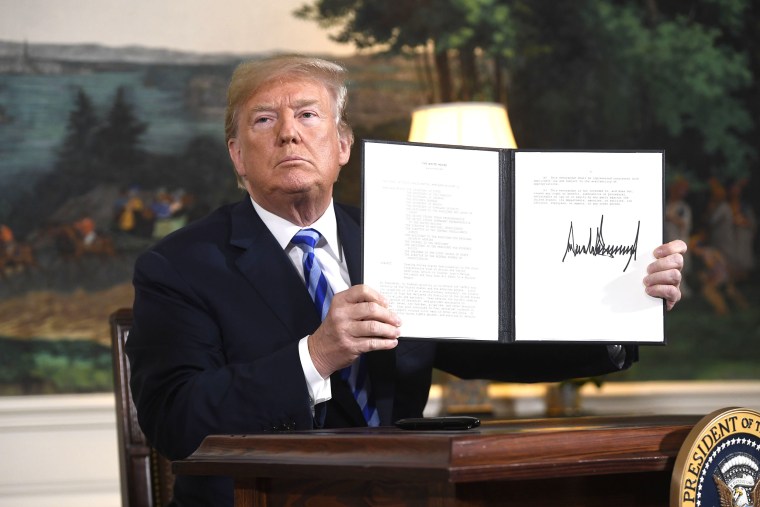One year ago today, President Donald Trump formally pulled the United States out of the deal that his predecessor had made with Iran to lift sanctions in exchange for Tehran easing its nuclear activities. Since then, Trump has introduced some of the most robust economic sanctions that have ever been placed on Iran and last month labeled the Iranian Revolutionary Guard Corps a terrorist organization, the first time the U.S. has so designated part of another country’s government.
With sharply reduced trade, Iran has fewer resources to make trouble around the world.
After Trump pulled out of the deal, which rewarded Iran financially for making narrow and temporary promises to curtail aspects of its nuclear program, critics of the president warned that his policies would put the U.S. on a path to war with Tehran and that the U.S. would be isolated in the world.
But a year on, war hasn’t broken out and it’s worth looking at what has — and hasn’t — happened for a clear-eyed assessment of the president’s “maximum pressure” strategy. That strategy has seen the White House this week deploy a carrier strike group to the Middle East as a defensive force for stability and calm, intended to deter Iran or a rogue branch of its government from attacking Americans or American interests. It has also demanded Iran change its behavior and linked sanctions to the regime’s hostage taking and support for terror groups, the Taliban, the Houthi rebels in Yemen and its nuclear and ballistic missile programs. And America has subjected all nations to U.S. sanctions for any imports of Iranian oil.
Such a clear-eyed assessment shows unequivocally that Trump’s strategy is working. The U.S. has the regime’s economy on its heels. Iranian President Hassan Rouhani acknowledged as much in his address Wednesday calling for fresh negotiations. So, though critics are warning that the recent deployment and the latest move on oil imports has raised tensions and threatens an outbreak of conflict, in fact their fears are overblown. Instead, there is now evidence that we are safer as a result of Trump’s policies, and that we should further ratchet up Iran’s economic isolation to strengthen our position even more.
The actions Trump has taken have already caused Iran’s economy to slow to a crawl. Its currency, the rial, is now useless because the flight of foreign capital and Tehran’s difficulty in finding trading partners willing to accept the risk of falling under U.S. sanctions have triggered hyperinflation. Business leaders outside of communist and authoritarian regimes showed no interest in even being in the same room as Iranian business leaders at the country’s premier energy conference. Just last year, 600 foreign companies from 38 countries were registered. This year the number of companies registered shrank by almost 90 percent.
With sharply reduced trade, Iran has fewer resources to make trouble around the world. That restricts its influence, which has been driven by the fear Tehran has stoked through its ability to launch terror attacks via the Revolutionary Guards and terrorist proxies. The regime has slowed its payments to Hezbollah, which has reduced the group’s power to fight on behalf of Syrian President Bashar al-Assad, threaten Israel’s security and plan terror operations in the West.
These are all signs that Iran is weaker today than it was a year ago and therefore less likely to risk confrontation with America. And yet, there is more to be done. Greater financial pressure on the regime affects its cost-benefit analysis of continuing the behaviors that have led to its economic isolation.
According to press reports, the White House is considering fresh sanctions on the purchase of Iranian petrochemicals, Iran’s second-largest export industry. The regime can also be downgraded to a full blacklisting by the FATF, an international banking watchdog group, which would make global banking near impossible.
Europe, too, can get on board by scrapping its sanctions-busting scheme to facilitate trade. Individual nations can shrink Iran’s diplomatic presence by ordering Tehran to reduce its staffs to a bare minimum and can continue exploring ways to constrain Iran’s “rapidly improving” and illegal ballistic missile program.
It’s time to acknowledge that the application of “maximum pressure” is working in ways that the Iran nuclear deal never did and never could.
It’s time to acknowledge that the application of “maximum pressure” is working in ways that the Iran nuclear deal never did and never could, because it failed to address the full scope of Iran’s bad behavior or acknowledge the value of undercutting the regime’s ability to project strength abroad and at home.
Doomsday hasn’t come. War is most certainly not on the horizon. America is in a stronger position and Iran’s capabilities are weakened. Opponents of the president’s policies should be honest and acknowledge the success of his approach. Doing so simply acknowledges a truth that will help improve U.S. national security and create bipartisan support for what the president is doing.
We need to stay the course and double-down on policies toward Tehran that restrict Iran’s activities and at long last compel changes that make the world safer.

